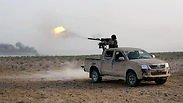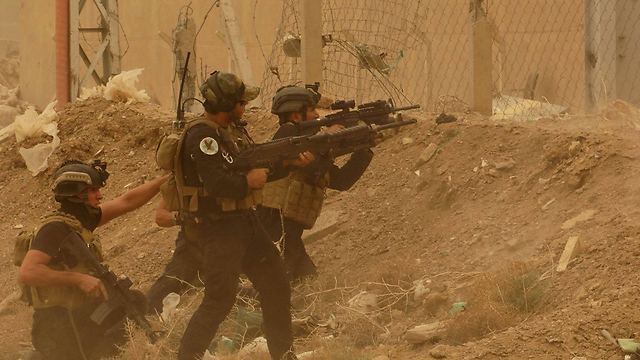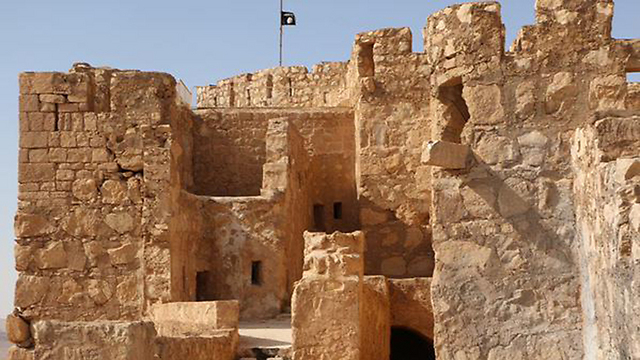
Iraq regains ground from Islamic State; mass deaths reported in Palmyra
Iraqi troops retake town of Husaiba and now plan to make advances towards Ramadi, while in Palmyra, ISIS is said to be targeting Syrian government employees, murdering more than 400.
Iraqi forces recaptured territory from advancing Islamic State militants near the recently-fallen city of Ramadi on Sunday, while in Syria the government said the Islamists had killed hundreds of people since capturing the town of Palmyra.
The fall of Ramadi and Palmyra, on opposite ends of the vast territory controlled by Islamic State fighters, were the militant group's biggest successes since a US-led coalition launched an air war to stop them last year.
The near simultaneous victories against the Iraqi and Syrian armies have forced Washington to examine its strategy, which involves bombing from the air but leaving fighting on the ground to local forces in both countries.
In a sharp criticism of Washington's ally, US Defense Secretary Ashton Carter accused Iraq's army of abandoning Ramadi, a provincial capital west of Baghdad, to a much smaller enemy force.
"The Iraqi forces just showed no will to fight," he told CNN's State of the Union program. "They vastly outnumbered the opposing force, and yet they withdrew from the site."
Hakim al-Zamili, the head of the parliamentary defense and security committee, called Carter's comments "unrealistic and baseless."
He said the US should bear much of the blame for the fall of Ramadi for failure to provide "good equipment, weapons and aerial support" to the soldiers. Now, he said, the US military is seeking to "throw the blame on somebody else."
Iraq's government, along with Iran-backed Shi'ite militiamen and locally-recruited Sunni tribal fighters, launched a counter-offensive on Saturday, a week after losing Ramadi. A police major and a pro-government Sunni tribal fighter in the area said they had retaken the town of Husaiba al-Sharqiya, about 10 km (6 miles) east of Ramadi.
"Today we regained control over Husaiba and are laying plans to make more advances to push back Daesh fighters further," said local tribal leader Amir al-Fahdawi, using an Arabic acronym for Islamic State, also known in English as ISIS or ISIL.
"The morale of the (pro-government) fighters is high after the arrival of reinforcements and loads of ammunition," Fahdawi said. "Today's advance will speed up the clock for a major advance to regain control of Ramadi."
Planes were bombing Islamic State positions on the opposite bank of the Euphrates river, where the militants were launching mortars and sniper fire to prevent the pro-government forces advancing, Fahdawi and the police major said.
Syrian army prepares for counter attack
The Syrian army has been deploying troops in areas near the ancient town of Palmyra in apparent preparation for a counterattack to retake it from the Islamic State group, Gov. Talal Barazi of the central province of Homs told AP on Sunday.
Barazi, the governor, said troops are fighting with IS gunmen in the nearby Jizl area. "There are plans, but we don't know when the zero hour for a military act in Palmyra," Barazi said without elaborating.
Days after taking Ramadi, Islamic State also defeated forces of the Syrian government of President Bashar Assad to capture Palmyra, home to 50,000 people and site of some of the world's most extensive and best-preserved Roman ruins.
The fighters have killed at least 400 people, including women and children in Palmyra since capturing the ancient Syrian city four days ago, Syrian state media said on Sunday.
It was not immediately possible to verify that account, but it was consistent with reports by activists that the Islamist fighters had carried out executions, leaving hundreds of bodies in the streets.
The Sunni Muslim militants have proclaimed a caliphate to rule over all Muslims from territory they hold in both Syria and Iraq. They have a history of carrying out mass killings in towns and cities they capture, and of dynamiting and bulldozing ancient monuments, which they consider evidence of paganism.
"The terrorists have killed more than 400 people ... and mutilated their bodies, under the pretext that they cooperated with the government and did not follow orders," Syria's state news agency said, citing residents inside the city.
Many of those killed were state employees, including the head of the nursing department at the hospital and all her family members, it said.
Islamic State supporters have posted videos on the Internet they say show fighters going room to room in Palmyra's government buildings, searching for hiding troops and pulling down pictures of Assad and his father.
Syria's Prime Minister Wael al-Halqi condemned what he called "a massacre" in Palmyra blaming Saudi Arabia, Qatar and Turkey for such killings because of their support for groups trying to remove Assad from power.
Al-Halqi called on the international community and all humanitarian organizations to pressure the governments that support "terrorism" to stop their support "as terrorism is posing a global danger." Saudi Arabia, Turkey and Qatar are main backers of Syrian rebels and opposition groups.
The Syrian Observatory for Human Rights, which monitors violence in the country with a network of sources on the ground, says beheadings have taken place in the town since it fell but has not given an estimate for the toll among civilians.
It says at least 300 soldiers were killed in the days of fighting before the city was captured.
"A bigger number of troops have disappeared and it is not clear where they are," Rami Abdulrahman from the Observatory told Reuters.
Meanwhile state-run news agency, SANA, said ISIS members are still preventing people from leaving Palmyra. The UN refugee agency, UNHCR, said that along with its partners they are preparing aid for some 11,000 people who fled Palmyra and surrounding villages.
A Facebook page used by ISIS to publish its statement posted a photo of 20 Syrian soldiers in uniform captured in Palmyra.
Setbacks
In Qatar, the European Union's foreign policy chief said the recent conquest of Palmyra and the Iraq city of Ramadi by the IS group only increases the need for greater political cooperation in the face of the militant threat.
"Only a political solution both in Syria and Iraq can provide a settlement for the crisis," Federica Mogherini said following a meeting between officials from the European Union and the six-nation Gulf Cooperation Council.
Qatari Foreign Minister Khalid bin Mohammed al-Attiyah defended the role of the US-led coalition conducting airstrikes against the Islamic State group. Qatar plays a supporting role in the coalition, allowing forces to use its vast al-Udeid air base.
"We cannot say that the coalition is failing. No the coalition is not failing but we have always said that the air campaign is not enough. There are so many steps which we have to cooperate and coordinate together to make the campaign against terrorism effective," he said.
Washington supports the government of Iraq but is opposed to Assad's government in Syria, making it more difficult to build a unified coalition against Islamic State, the most powerful force among Sunni Arabs in multi-sided civil wars in both countries.
In Iraq, government forces and Iran-backed Shi'ite militia advanced against the Sunni militants north of Baghdad in the Tigris river valley earlier this year, recapturing former dictator Saddam Hussein's home city of Tikrit.
But the insurgents responded by going on the offensive west of Baghdad in the valley of Iraq's other great river, the Euphrates, among the most hotly fought areas during the 2003-2011 US occupation.
Washington worries that Baghdad's response of sending Shi'ite militia into the area for a counter-offensive could increase sectarian anger and play into Islamic State's claim to defend Sunnis from a Shi'ite dominated government in Baghdad.
In Syria, where a four-year civil war has killed 250,000 people and made 8 million homeless, Assad's government has been losing territory in recent months, both to Islamic State and to other Sunni groups, some of which are supported by the West.












